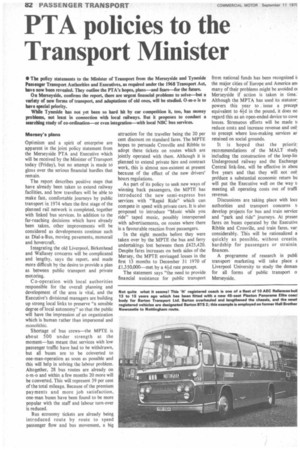PTA policies to the Transport Minister
Page 80

If you've noticed an error in this article please click here to report it so we can fix it.
The policy statements to the Minister of Transport from the Merseyside and Tyneside Passenger Transport Authorities and Executives, as required under the 1968 Transport Act, have now been revealed. They outline the PTA's hopes, plans—and fears—for the future.
On Merseyside, confirms the report, there are urgent financial problems to solve—but a variety of new forms of transport, and adaptations of old ones, will be studied. 0-m-o is to have special priority.
While Tyneside has not yet been so hard hit by car competition it, too, has money problems, not least in connection with local railways. But it proposes to conduct a searching study of co-ordination—or even integration—with local NBC bus services.
Mersey's plans Optimism and a spirit of enterprise are apparent in the joint policy statement from the Merseyside PTA and Executive which will be received by the Minister of Transport today (Friday), but no attempt is made to gloss over the serious financial hurdles that remain.
The report describes positive steps that have already been taken to extend railway facilities, and how travellers will be able to make fast, comfortable journeys by public transport in 1974 when the first stage of the planned rail network is completed, together with linked bus services. In addition to the far-reaching decisions which have already been taken, other improvements will be considered as developments continue such as Dial-a-Bus, moving pavements, monorail and hovercraft.
Integrating the old Liverpool, Birkenhead and Wallasey concerns will be complicated and lengthy, says the report, and made more difficult by the desire to provide a plan as between public transport and private motoring.
Co-operation with local authorities responsible for the overall planning and development of the area is vital, and the Executive's divisional managers are building up strong local links to preserve "a sensible degree of local autonomy" so that the public will have the impression of an organization which is human rather than impersonal and monolithic.
Shortage of bus crews—the MPTE is about 500 under strength at the moment—has meant that services with low passenger traffic have had to be withdrawn, but all buses are to be co'nverted to one-man-operation as soon as possible and this will help in solving the labour problem. Altogether, 28 bus routes are already on o-m-o and within a few months 20 more will be converted. This will represent 39 per cent of the total mileage. Because of the premium payments and more job satisfaction, one-man buses have been found to be more Popular with the staff and labour turn-over is reduced.
Bus economy tickets are already being introduced route by route to speed passenger flow and bus movement, a big attraction for the traveller being the 20 per cent discount on standard fares. The MPTE hopes to persuade Crosville and Ribble to adopt these tickets on routes which are jointly operated with them. Although it is planned to extend private hire and contract work, this is almost non-existent at present because of the effect of the new drivers' hours regulations.
As part of its policy to seek new ways of winning back passengers, the MPTE has introduced the new semi-express bus services with "Rapid Ride" which can compete in speed with private cars. It is also proposed to introduce "Music while you ride" taped music, possibly interspersed with advertisements, on routes where there is a favourable reaction from passengers.
In the eight months before they were taken over by the MPTE the bus and ferry undertakings lost between them .£425,420. Despite fares increases on both sides of the Mersey, the MPTE envisaged losses in the first 13 months to December 31 1970 of L1,350,000—met by a 4+d rate precept.
The statement says "the need to provide financial assistance for public transport
from national funds has been recognized ii the major cities of Europe and America an' many of their problems might be avoided 01 Merseyside if action is taken in time. Although the MPTA has used its statutor powers this year to issue a precepi equivalent to 44c1 in the pound, it does no regard this as an open-ended device to cove losses. Strenuous efforts will be made a reduce costs and increase revenue and mil to precept where loss-making services ar retained on social grounds.
It is hoped that the priorit recommendations of the MALT study including the construction of the loop-fin Underground railway and the Exchange Central link-line, will be effective in abou five years and that they will not onl; prdduce a substantial economic return bu will put the Executive well on the way a meeting all operating costs out of traffi revenue.
Discussions are taking place with loot authorities and transport concerns a develop projects for bus and train service and "park and ride" journeys. At reser fares on buses operated by the Executive Ribble and Crosville, and train fares, van considerably. This will be rationalized a quickly as possible, without creatin hardship for passengers or strainin finances.
A programme of research in publi transport. marketing will take place a Liverpool University to study the deman for all forms of public transport o Merseyside.




















































































































































































































































